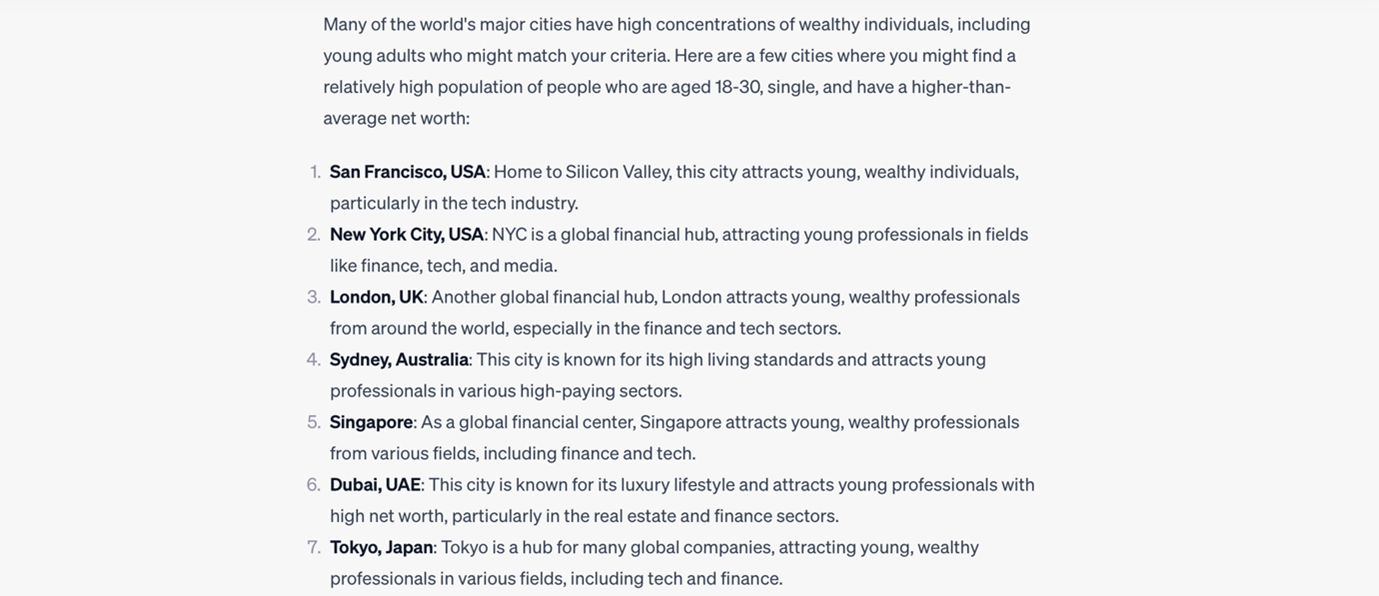ChatGPT - Marketing and Research Use Case
Posted on 15th September 2023 at 15:37
In my previous article we had a brief introduction into some areas where the newest AI tools could help your business.
In this article, I’m going to dive deeper into one of those areas – namely research, marketing, and automation.
Until recently, Cloud platforms such as Microsoft Azure have made it easier than ever to use specialist AI hardware and software, but you still needed data scientists to use those tools.
Then ChatGPT hit the headlines with its Davinci Large Language Model (LLM). This model allowed anyone, regardless of understanding or experience, to ask questions or ‘prompt’ ChatGPT in plain English.
One of the first real world use cases for this technology was to write marketing material. These days, you can simply ask ChatGPT to ‘write an article about cloud’ and the software will happily spit out a seemingly well thought out series of paragraphs on your subject – and, unlike previous attempts at such technologies, the results were scarily human like.
As powerful as this may seem, it only scratches the surface, and doesn’t really demonstrate the true power for business use. I’d go out on a limb and state that most marketing agencies would laugh at such use, citing issues with originality, plagiarism, or simply that facts can be wrong (yes, ChatGPT does get facts wrong).
I asked David Walsh, Chief Growth Officer at Gravity Global, one of the world’s largest marketing consultancies, what his view on AI was, and if it was any use.
"I think AI/ML and tools such as ChatGPT and MidJourney are going to be bigger than the previous digital revolution."
That’s a bold statement, but one that many industry leaders are also citing, including Microsoft’s own CEO Satya Nadella. But of course, as a major investor of ChatGPT, he could be biased, so I asked David if AI was hype, or if it had actual business benefits, and if he could give any examples.
"Absolutely", enthused David, "we’ve been using these tools to help with brainstorming when starting new campaigns. Using ChatGPT we can ask it about industry trends, perform competitor analysis, even develop strapline ideas based on a product description. MidJourney can then be used to create mood boards and potential creative ideas. Of course, we don’t just use what it produces, but the ideas give us a great starting point. With just this use alone, I’d estimate we are improving productivity by a minimum of 25% by speeding up this part of the process."

David was also keen to point out, that they are always upfront about the use of AI tools with their customers. "Transparency is key, and we are very explicit how we use AI, and perhaps more importantly don’t. Aside from being open, the US patent office have ruled you cannot copyright a purely AI generated design or image – it must be heavily modified first."
This raises an interesting point about who owns the IP for computer generated content – certainly not the user. However, this is a complex area and a bigger discussion for another time.
"Next, we can continue the conversation with ChatGPT and research where best to focus our marketing efforts by creating complex customer persona prompts. Again, the tooling allows us to perform this type of research in a matter of minutes, when normally we would have to spend days."
This may resemble a sound bite, so I wanted to give it a whirl myself, and I’d encourage you to try it as well.
When marketing a product, you often identify what the perfect customer’s demographics are – age, income, marital status etc. For example, if you have a product aimed at young affluent singles, we could ask ChatGPT;
‘which major cities in the world have the highest population of people who are aged 18-30, are single, and have a higher then average net worth.’ Here’s the response.

Next, I asked it to zoom into London, and get a bit more specific.

The above is just a very quick example of how ChatGPT can be used for research, and of course much of the value comes by knowing which questions to ask. Which led on well to my next question.
"Do you think AI will take everybody’s job?"
This is a very sensitive area, and of course this early on nobody can possibly know for sure, however David’s response was.
"With any new technology, especially one that creates efficiencies, there’s always the view that you can do more with fewer people. I think in this case, that is probably going to be true.”
"However, it is also a great leveller, because it can help people, who may not always be the best at strategic thinking, or creative writing, to improve their skills – what is most important is the prompting and the post analysis and improvement to what the AI has generated. But it won’t remove the need for marketeers and researchers because you still need to understand what you’re trying to achieve and to interpret what you receive back – then there is also the selling of the idea – that will always remain human – at least in my lifetime."
In other words, AI is a tool that can enhance your existing talents, but it doesn’t remove the need to at least understand the role – in this case marketing. And this is highlighted with tools such as ChatGPT, as to get this most from it you need to know what to ask.
Finally, I was keen to ask about automation using AI.
"Certainly any mundane task that can be automated should be – Britain is notoriously poor in terms of efficiency and performance against countries like the US. Examples that spring to mind would be an automated twitter (now called X) or Instagram posting tool that uses our existing content as a base."
The combination of AI tools and a company’s own data, along with automation are a top priority for many organisations today, and although it is easier than ever to build such tools, you still need to ensure your architecture and platforms prevent the wrong data being exposed.
In fact, as a simple test, I recently built my own automated app in Azure that would read data from a database of blog entries, and spit out tweets based on them, with links back to the content and hashtags. The whole process took about an hour! Partly since I used ChatGPT to help me write the code – but I’ll save that for another article.
If you would like to learn more, or would be keen to see how AI could help your business, reach out to Brett Hargreaves at brett.hargreaves@ir77.co.uk
Share this post:

